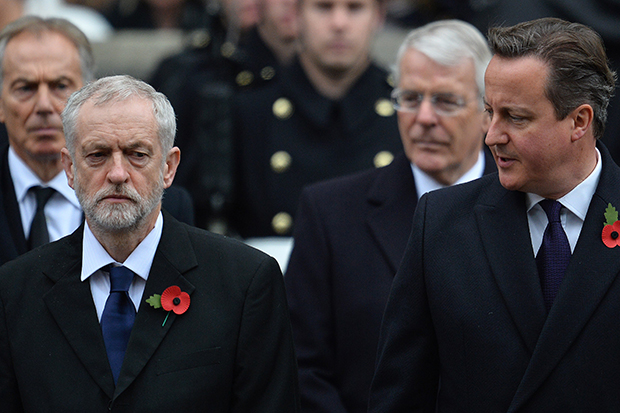What strange people we Brits are. We spend years moaning that our politicians are cynical opportunists who don’t stand for anything. Then along comes an opposition leader who has principles — and appears to stick by them even when it makes him unpopular — and he is dismissed as a joke.
Jeremy Corbyn has been ridiculed in recent days for the feebleness of his foreign policy. It is widely agreed that his positions on terrorism and Isis show how unelectable and useless he is. At the same time, we say he is a grave threat to national security.
But what has Corbyn said that is so stupid or dangerous? In the wake of the attacks in Paris, he declared that Britain ‘must not be drawn into responses that feed the cycle of violence and hate’. He has urged his country not to ‘keep making the same mistakes’ in the Middle East, something he has been saying for decades. ‘Enthusiasm for interventions has only multiplied the threats to us,’ he says, not unreasonably. He has said he will not support airstrikes in Syria unless it is clear that military action will help us achieve our strategic objective of defeating Isis.
If you look at Corbyn’s actual words — rather than the Twitter feeds of the organisations he is affiliated with or the outbursts of his crazy fans — his response to the difficult and frightening problem of terrorism has been sensible, cautious and moral. Like a good Christian, he thinks violence should be a last resort, as he showed with his reluctance to embrace a ‘shoot to kill’ policy for security services in Britain, and his statement that it would have been ‘far better’ for the serial beheader Mohammed Emwazi (‘Jihadi John’) to have been tried in court rather than taken out by drones.
Ah, say Corbyn’s critics, but he is equivocating. As Nick Cohen and Charles Moore argued in the magazine last week, Corbyn and the radical left are not anti-violence but anti-West. They have to stop themselves from saying what they really think, which is that we privileged Europeans deserve to be terrorised, because to do so would be political suicide. They therefore adapt their language or speak in code.
It is true that the Corbynistas’ view of the world is as Manichean as George W. Bush’s — only where Bush saw bad they see good, and vice-versa. It is also true, probably, that Corbyn and his closest allies change their language in public to sound less offensive to the majority, while still dog-whistling to their radical fans. But all politicians do that. And while Corbyn’s language may at times be slippery, in his politics he has remained almost shockingly steadfast.
How easy it would have been for him to have added his voice to the general whooping at the death of Emwazi. Or to have said that any wannabe terrorist can expect to be obliterated by our security services wherever they are found. But he hasn’t. Despite intense pressure to echo the majority view, Corbyn has more or less stuck to the non–violent positions that he has always held. Even the most belligerent Tory must admit that takes courage, even if it is politically naive.
Compare Corbyn’s foreign policy with David Cameron’s and the Labour leader begins to look downright noble. Cameron, remember, used to present himself as an alternative to war-on-terror zealots. As leader of the opposition, he used to say that liberty ‘cannot be dropped from the air by an unmanned drone’. As Prime Minister, however, he has been banging away on the war drum, trying to persuade the public to sing along.
It was Cameron who, along with Sarkozy, led the charge to attack Libya and remove Gaddafi. That intervention ended the rule of a nasty dictator, but it also created a failed state, another dangerous ‘ungoverned space’ through which migrants now pour in their millions en route to Europe. Libya has become both a handy training ground for jihadis and a springboard for them to launch into the West. But the Cameroons have never admitted to their failure.
It becomes clearer with every crisis that Cameron makes up his foreign policy as he goes along. This week his aides have been pompously telling MPs to ‘be Churchill not Chamberlain’ in the face of the terror threat. Cameron hopes that the prevailing mood of fear and loathing about Isis will mean he can persuade Parliament to bomb Syria. Except we all know that two years ago, Cameron wanted to bomb Isis’s great enemy, President Assad, which would have been a tremendous boon to Islamist scumbags across the region.
You might argue that such a dramatic volte-face is the sign of a true leader — someone willing to accept when he is wrong. Except that Cameron and his gang have never admitted they were wrong. George Osborne maintains that Parliament’s rejection of the move against Assad in 2013 was ‘one of the worst decisions the House of Commons has ever made’.
We all wish Isis gone, but the new plan to bomb Syria is as little thought-through as the last one. There’s no evidence that more air strikes (without troops on the ground) will bring peace to Syria and Iraq. To succeed, objectives and a strategy are needed, both of which the Cameroons lack. Jeremy Corbyn is mocked for calling for a ‘negotiated settlement’ with Assad and other parties in the conflict — how wet! — but at least he is trying to think about the future. Cameron’s Syria plan is to get himself worked up, throw a few more bombs at the baddies, and hope for the best. We have to ask: which leader is the more deluded?
Got something to add? Join the discussion and comment below.
Get 10 issues for just $10
Subscribe to The Spectator Australia today for the next 10 magazine issues, plus full online access, for just $10.
Freddy Gray is deputy editor of The Spectator.
You might disagree with half of it, but you’ll enjoy reading all of it. Try your first month for free, then just $2 a week for the remainder of your first year.















Comments
Don't miss out
Join the conversation with other Spectator Australia readers. Subscribe to leave a comment.
SUBSCRIBEAlready a subscriber? Log in